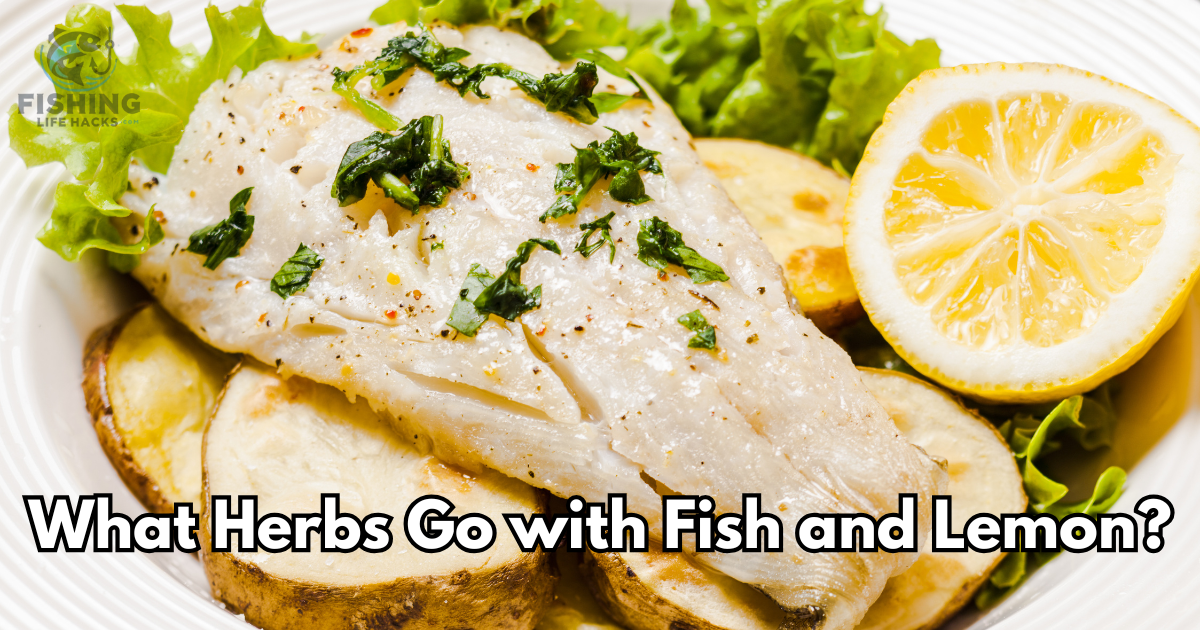What Herbs Go with Fish and Lemon: A Complete Guide

Finding the perfect combination of herbs with fish and lemon can elevate your culinary experience, turning ordinary meals into vibrantly aromatic meals. Fish’s mild texture pairs well with lemon’s refreshing citrus notes – but for maximum effectiveness you must choose complementary herbs that bring out their full potential. Let’s examine which are best to pair together as well as tips for crafting delectable yet balanced dishes.
Why Herbs Matter in Fish and Lemon Dishes
Fish has a mild flavor profile, making it the ideal candidate for adding subtle yet vibrant herbs for added depth and brightness. Lemon’s tart acidity compliments fish perfectly while providing a refreshing citrus bite. When used properly, herbs not only amplify both fish and lemon flavors simultaneously but also add depth, complexity and aroma – perfect whether baking, grilling or pan-searing your meal! The right herbs can truly elevate a dish.
The Best Herbs to Pair with Fish and Lemon
When selecting herbs that pair well with fish and lemon, it’s essential to take into account both its type and method of preparation. Below are a selection of great pairings between these ingredients.
1. Dill
Flavor Profile: Fresh, slightly tangy, and herbaceous
Dill is one of the most versatile herbs when it comes to pairing fish with herbs, especially lemon. Dill’s subtle, anise-like flavor perfectly complements mild white fish such as cod, halibut and tilapia while its grassy fresh profile balances lemon’s acidic punch for a balanced and refreshing flavor profile that is both herbal and citrusy.
Cooking Tips: Dill is an ideal herb to add freshness and zest to fish marinades and dressings; sprinkle some over finished dishes for an instant burst of freshness! Lemon-dill sauces work particularly well when grilling or baking fish as a side.
2. Parsley
Flavor Profile: Fresh, slightly peppery, and earthy
Parsley is an herb with endless versatility that pairs beautifully with most fish dishes. Its subtle yet clean flavor doesn’t overshadow the delicate tastes of the fish itself and when combined with lemon, can add zesty freshness. Flat-leaf or curly parsley both work wonderfully as garnishes as well as components of sauces and marinades made using fish-based recipes.
Cooking Tips: Finely chop fresh parsley and sprinkle it over grilled or pan-seared fish for an extra dose of flavor. Parsley may also be added to lemon-based vinaigrettes or herb-infused butter to increase their intensity of taste.
3. Tarragon
Flavor Profile: Sweet, slightly licorice-like, with a hint of pepper
Tarragon is an ideal complement to both fish and citrus in French cuisine, particularly trout, salmon and bass dishes where its unique blend of herbal sweetness with an anise undertone works wonderfully together. Additionally, its distinctive taste – which combines herbal sweetness with anise undertones – pairs wonderfully with the bright acidity of lemon. Tarragon stands out when added directly into dishes where its unique flavors can truly shine like with French cuisine dishes such as these three dishes.
Cooking Tips: Tarragon can be used in sauces such as bearnaise and tarragon cream sauce, herb blends, marinades or as a garnish on baked or roasted fish.
4. Thyme
Flavor Profile: Earthy, slightly minty, and woody
Thyme’s earthy, savory flavor makes it the ideal complement to fish and lemon, adding depth and complexity without overshadowing the delicate nature of the fish. It works especially well when used with firmer-textured species such as salmon or swordfish that can withstand grilling or roasting processes.
Cooking Tips: Add fresh thyme sprigs when grilling fish or use it in fish stews or soups. A squeeze of lemon and some thyme sprigs can add an extra flavor boost when serving tuna or sea bass on the grill.
5. Basil
Flavor Profile: Sweet, peppery, with a slight floral note
Basil offers a bright, slightly peppery flavor that pairs beautifully with lemon’s citrusy nuances, making it a delicious compliment to fish varieties like snapper, trout and sole. Plus, its freshness pairs beautifully with zesty lemon’s zesty punch for Mediterranean-inspired meals or summer fish dishes.
Cooking Tips: Basil leaves are great additions to a pesto sauce or chopped finely and sprinkled on fish before grilling or sauteeing, or they add fragrance and brightness when used as an addition to fish salads, providing a delightful contrast against lemon-based dressings.
6. Chives
Flavor Profile: Mild, onion-like with a hint of garlic
Chives make an ideal accompaniment for lemon-seasoned fish dishes, complementing its tart acidity without overshadowing delicate white species like flounder or sole. Chives can also be added as an elegant garnish in light sauces or as part of garnishes.
Cooking Tips: Chopped fresh chives make an excellent topping to any fish dish just before serving, as well as an effective ingredient for adding zesty lemon butter or lemon aioli sauces.
7. Oregano
Flavor Profile: Earthy, slightly bitter, and pungent
Oregano’s bold flavor pairs wonderfully with richer fish like mackerel, sardines or grilled tuna, creating a balance between earthy and citrus notes – making it the ideal herb to add Mediterranean-style dishes.
Cooking Tips: Oregano makes an excellent marinade ingredient when grilling or roasting fish, particularly those served grilled or roasted with lemon juice and fresh oregano for an exciting yet fresh dish.
8. Rosemary
Flavor Profile: Pine-like, slightly woody, and fragrant
Rosemary’s strong woody flavor pairs perfectly with heartier fish varieties like salmon, swordfish and tuna. When combined with citrus such as lemon juice or lime, its intense flavor is moderated while brightening its bitterness for an aromatic pairing that balances out both intensity and bitterness.
Cooking Tips: Rosemary can add depth of flavor to marinades, or be placed inside the cavity of whole fish before roasting or grilling. Smoky heat brings out its full potential in terms of aroma.
9. Cilantro
Flavor Profile: Fresh, citrusy, and slightly peppery
Cilantro is an aromatic herb that brings vibrancy to dishes inspired by Latin American, Thai or Indian cuisine. Its vibrant citrusy notes pair particularly well with fish with bold flavors such as cod, snapper or tilapia.
Cooking Tips: Fresh cilantro adds fresh zest to salsas, ceviches, or as a garnish on grilled fish dishes. Dot it with lemon juice for an elevated dish.
10. Mint
Flavor Profile: Cool, sweet, and slightly peppery
Mint is an unexpected yet delicious addition to Middle Eastern and Mediterranean-style fish dishes, providing its cool and refreshing properties an excellent counterpoint to lemon’s bright acidity, creating an aromatically vibrant dish.
Cooking Tips: Chopped fresh mint can add fresh minty goodness to salads or fish marinades, while its lemony-sweet aroma pairs perfectly with yogurt-based sauces used as side dishes with trout or sea bass grilled over an open flame.
How to Use Herbs with Fish and Lemon
1. Marinades and Dressings
To add flavorful flair to your fish dishes, herbs can be mixed with lemon juice and olive oil to form an easy marinade that infuses it with flavor. Parsley, basil, dill and tarragon work especially well when combined with lemon juice, garlic and olive oil – so allow at least 30 minutes before cooking for maximum effect.
2. Herb-Infused Butter or Oil
For added richness and flavor, an herb-infused butter or oil with lemon notes can add richness and depth. Simply melt or heat olive oil before mixing in finely chopped herbs such as parsley, thyme or rosemary along with lemon zest or juice before dousing over your fish immediately before serving.
3. Garnishing
Fresh herbs like chives, dill, parsley or basil can add an infusion of freshness and color to any dish, while adding extra flavor with just the squeeze of lemon before serving for maximum visual impact and delicious taste!
4. Herb Sauces and Pestos
Herb Sauces and Pestos To pair your fish, make a lemon-herb sauce or pesto with lemon juice, garlic cloves, pine nuts and basil pesto; or try creating a lemon-dill sauce – both are classic accompaniments.
Frequently Asked Questions
Conclusion
Selecting the proper herbs for fish and lemon might enrich your meal. Dill, parsley, basil and thyme all work wonders with its bright acidic notes as well as fish’s delicate flavours; using one or more of these herbs in your next fish dish with lemon will surely elevate its flavors even further! You can experiment to find combinations that suit both your personal taste and the fish you are cooking; next time when cooking fish with lemon use one or more of these herbs to let your creativity take flight.






